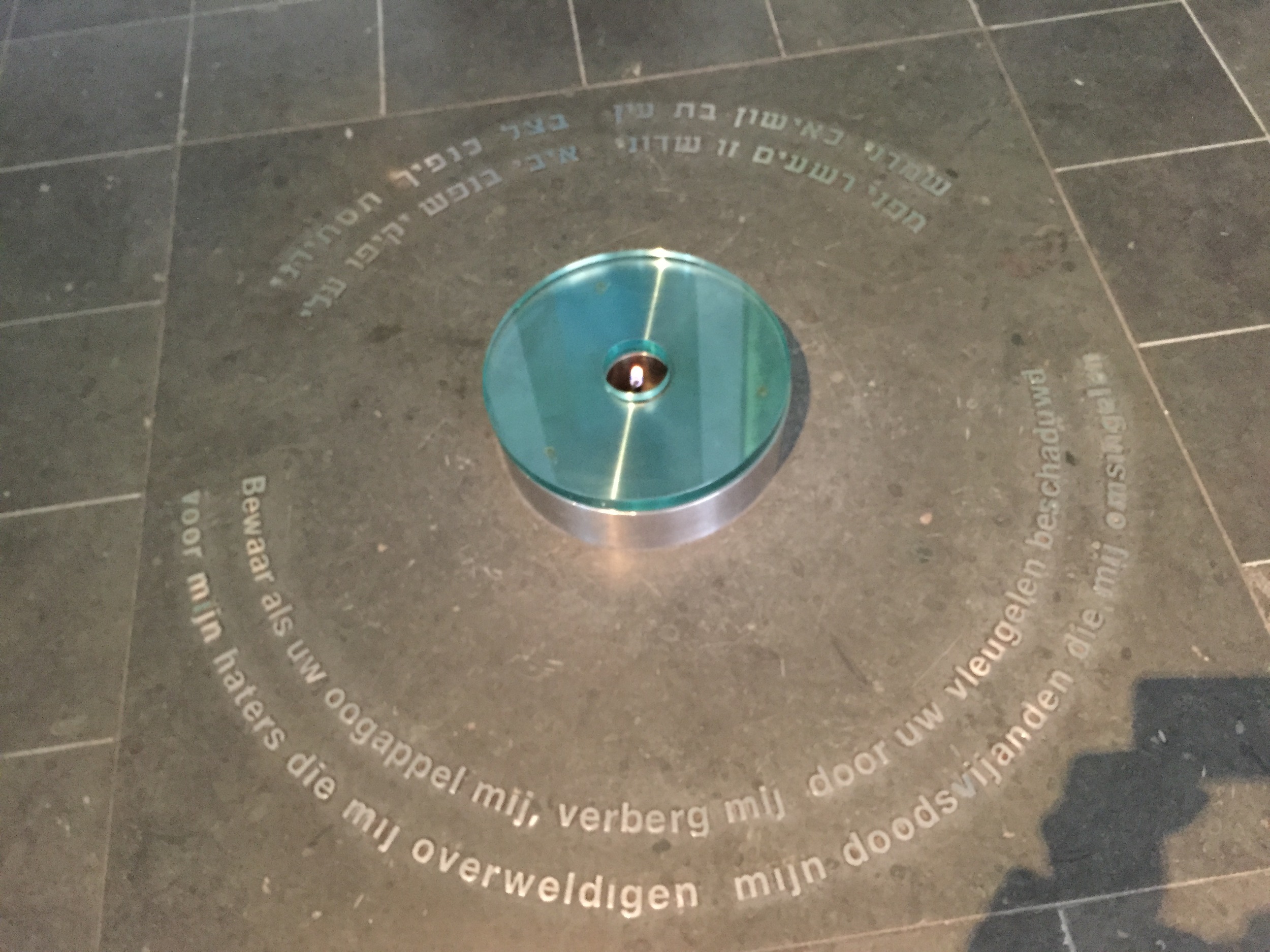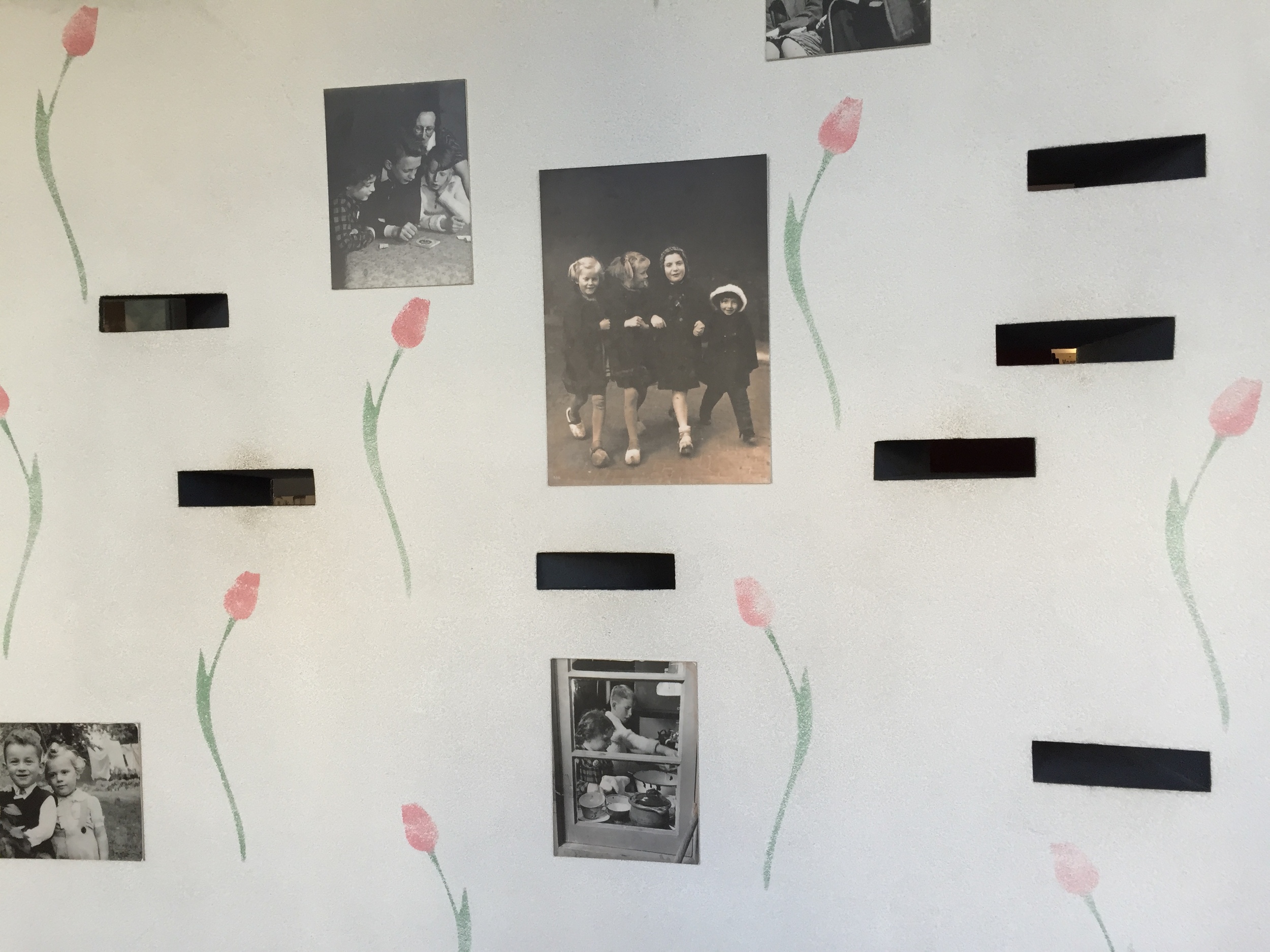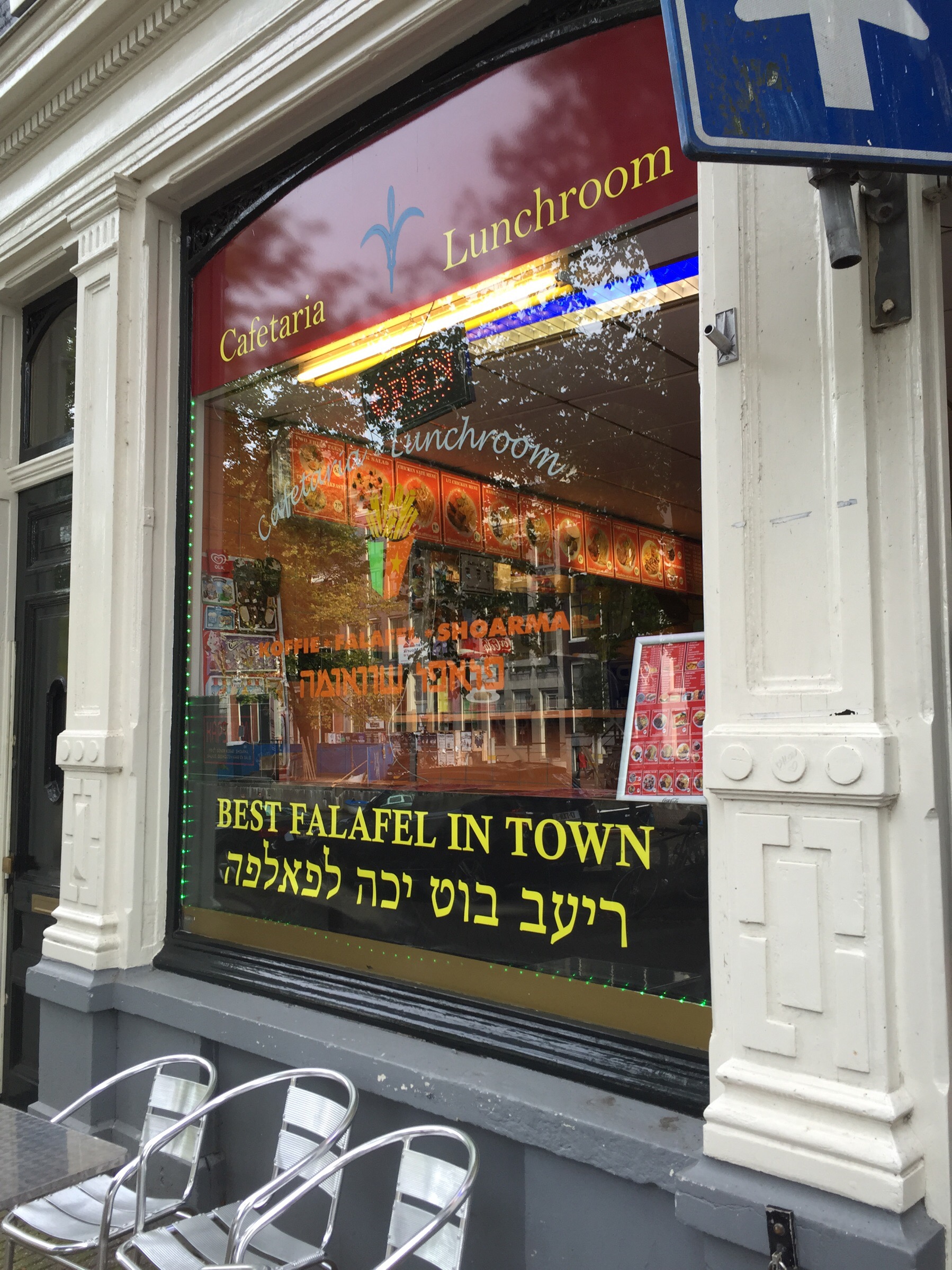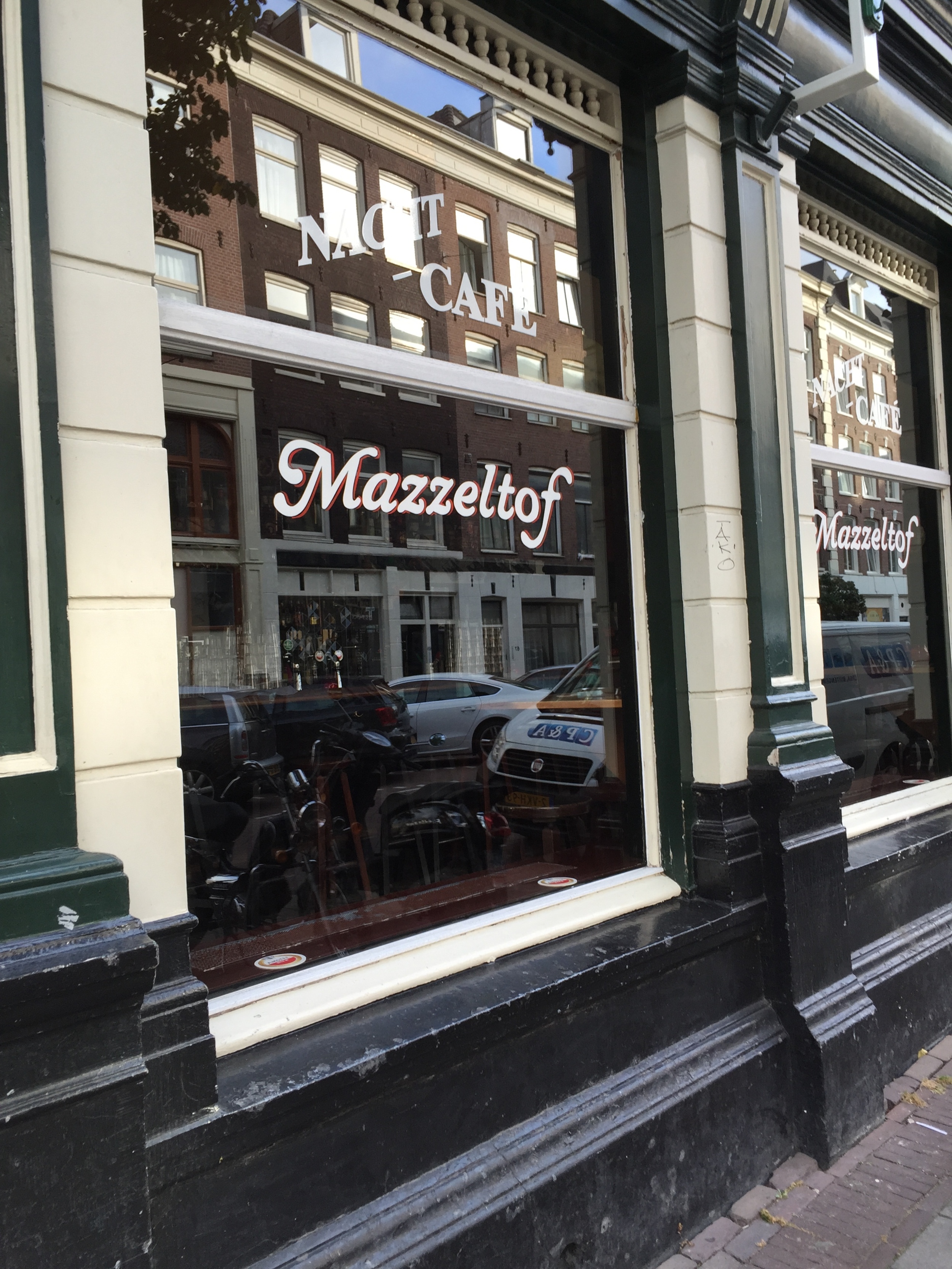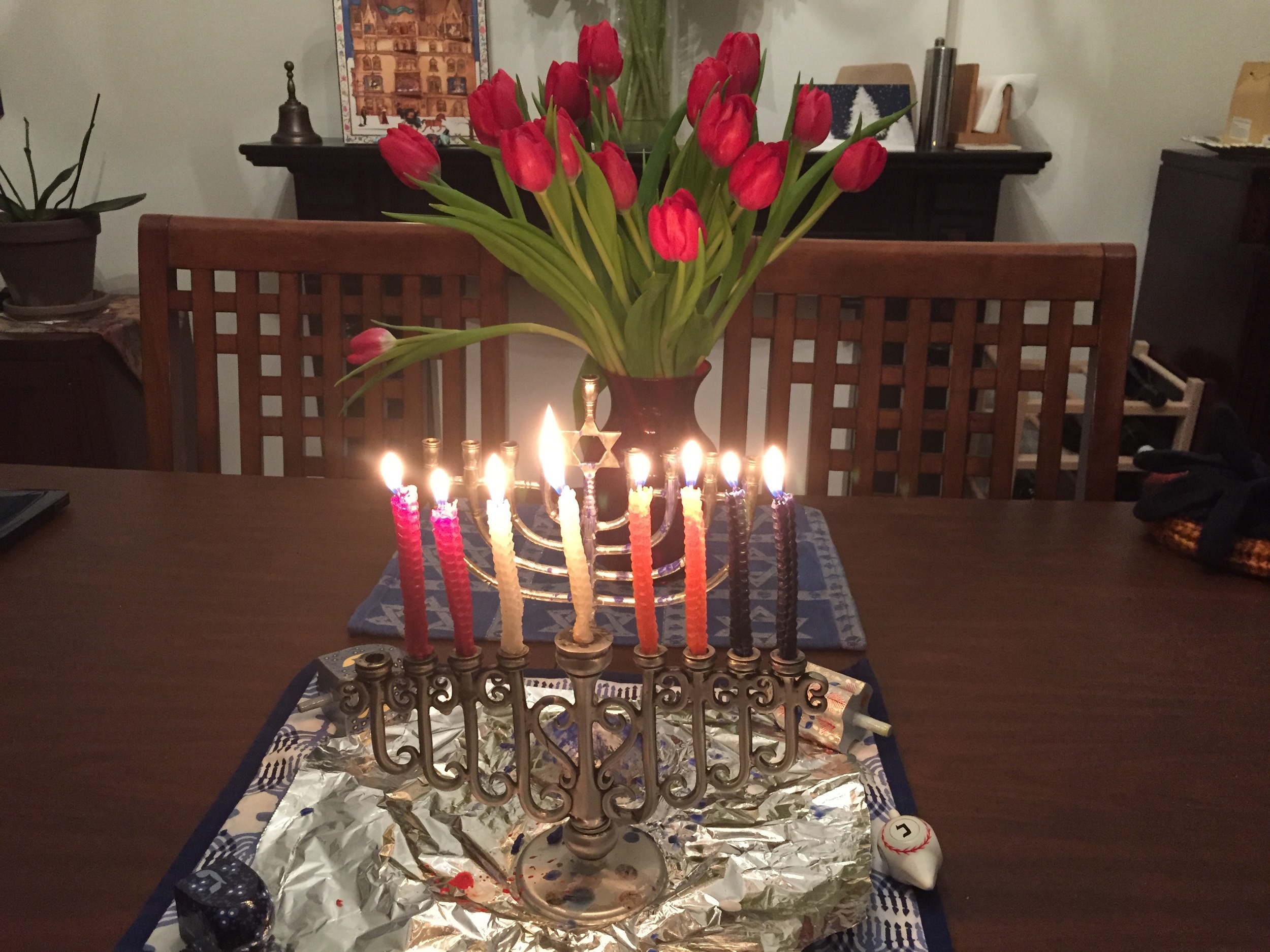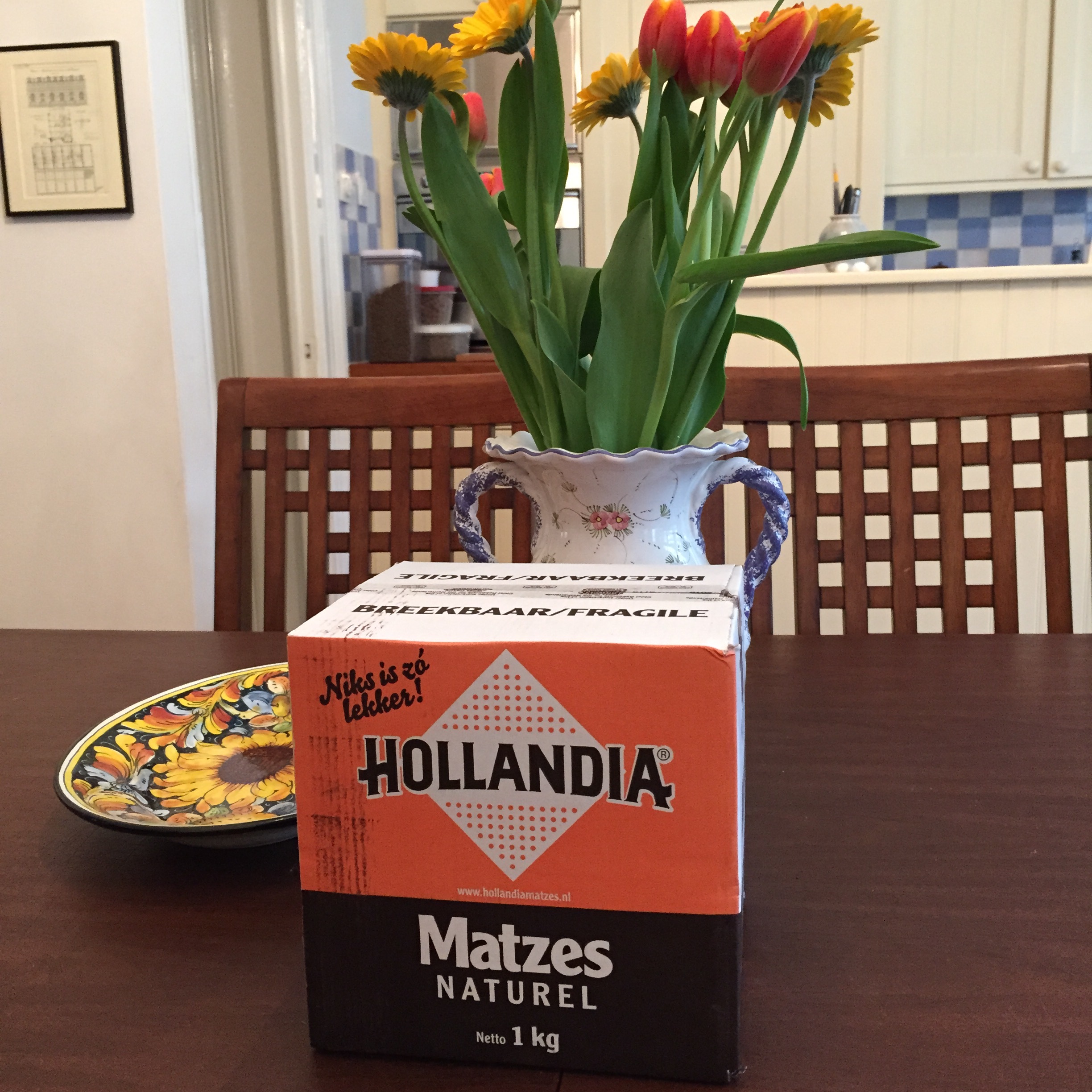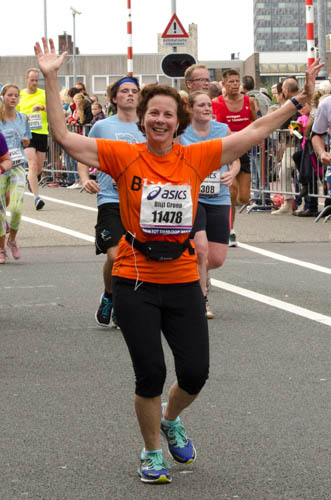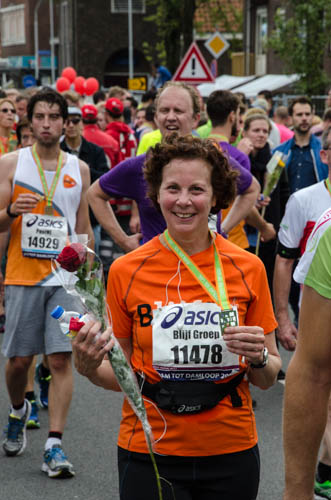Finding Our Tribe: Jewish Life in Amsterdam
Many of you have asked us during the year how it feels to be Jewish in Amsterdam. I finally feel like I have enough experience to write about this subject. Let me say from the start that my feelings about this are complicated. On the one hand, I know it's important for us to find other Jews to be friends with, and a synagogue to call home. That's what we did in the U.S. and it served us well. On the other hand, it hasn't been as easy to do that as we had hoped, for reasons I'll discuss later. So rather than harp on what our lives were missing the first year (a Jewish component being one) we chose instead to focus on all that we had gained with the big move here.
Last year, Rosh Hashanah and Yom Kippur arrived right after we did. We hadn't had time to learn our way around, much less to find a synagogue that felt like home. When we first walked into the synagogue we were trying on for size, this is what I saw on the wall:
A familiar face, and one that I have thought of so often in my life. Despite the sadness that photo conjures up, it helped me feel like I belonged somehow. However, once the service began, I realized just how lost we would be. I recognized many of the Hebrew words, but not the melodies of the songs and prayers. The "English" portion of the service was even more of a problem, since it was in Dutch. We heard isolated English words like "internet" and "Facebook" during the sermon, but had no idea why the congregants chuckled at times, or nodded their heads in agreement. And there was no smiling Membership Chair, like our friend Carrie in the U.S., to greet us at the door and welcome us. No one introduced themselves, or asked us who we were, other than the security guards outside with their military-style equipment.
Although I had read an abridged version of Anne Frank's biography with my class each year, seeing her on the wall inside the synagogue "in person" was quite another thing. It made me realize the significance of our move to Amsterdam and the way in which being Jewish here was so different form being Jewish in the U.S.
Over a million tourists a year visit the Anne Frank House. In fact, some of our friends were disappointed to find that if you come in the summer, you will likely not be able to get in. The lines snake around the block, and even waiting in line for hours does not guarantee you will even eventually get a ticket. I did go in the depths of off-peak season at the end of January. It was the 70th anniversary of the Liberation of Auschwitz. Inexplicably, there was no mention at the museum of this momentous day.
How have things changed in Amsterdam since the days Anne Frank lived here? Most noticeably there is the drastic dip in numbers. Before the war, the Jewish population of Amsterdam stood at 80,000, or 10% of the total population. 80% of them perished in the Holocaust. The Jewish population is now only about 15,000, out of about 800,000 total residents.
This is the Plantage neighborhood, known as the Jewish Cultural Quarter. It's where the Jewish Historical Museum is, and the Portuguese Synagogue, among other Jewish sites.
There are some encouraging efforts to tell the story of those who died, or who had to flee. A wonderful exhibit called Children of War featured portraits taken by a professional photographer in 1943. Recently, a woman and her daughter took up the task of identifying the subjects of the portraits and contacting them. They then partnered with the Oorlog in mijn buurt (War in my Neighborhood Project) which gives schoolchildren the chance to interview WW II survivors. The result was a very moving outdoor exhibit of posters telling each child's story, and showing the "child" as an elderly survivor. The lucky schoolchildren who got the chance to participate in this project!
The posters were all written in Dutch, but my friend Laura met the woman who undertook the research and created the exhibit. The next thing you knew, Laura had an English guide to the exhibit, and as expats here do, was eager to share hers and visit the exhibit again with me.
There has been a lot of attention in the media to the "plight" of Jews in Europe. That in turn has led to a flurry of "have you read this?" emails and FB messages. The Atlantic Monthly article was downright scary, as it detailed the many attacks on Jews in Europe, and described the exodus of Jews out of Europe to Israel. With thoughts of those attacks in mind, I was filled with an odd mixture of comforting and unsettling feelings when I saw the security guards at the synagogues we attended this year. After the Charlie Hebdo attacks in Paris in January, I remember reading that the Dutch government opposed putting military-style policeman in front of Jewish schools and synagogues. Nevertheless, they did put temporary-looking white metal police "offices" outside those Jewish spaces. We had to bring our passports to synagogue, and were asked many questions about where we lived, why we were in Amsterdam, and who Peter worked for. I tried not to feel nervous, but my heart was beating hard when we were finally waved inside. Later in the day on Yom Kippur, I walked Casey past the synagogue and noticed the armed guards standing at several corners near the synagogue. They were watching everyone who passed by with eagle eyes.
Maybe the experience of living through WW II, coupled with the present day fear, has led many Jews to simply choose to fade into the rest of society. At the Jewish Historical Museum, I learned that 57% of Dutch Jews do not practice in any way. An additional 17% consider themselves non-religious, but do observe certain traditions. I have seen reports in the news about anti-semitism, like this article about antisemitic chants at a soccer game. Apparently, for reasons that are a bit unclear, the soccer team Ajax has long been known as the "Jewish" team. It's not because the players are Jewish, but seems to have more to do with the fact that the original stadium was in the Jewish quarter. Apparently, the club embraced the Jewish connection, even including a Hava Nagila (an Israeli folk song) ringtone on its website. However, in recent years, antisemitic rival fans have become louder and more vocal. As a result, the club is trying to distance itself from the Jewish connection in order to quiet those antisemitic voices. Gone is the Hava Nagila ringtone. Still, my perception is that the antisemitic incidents are nowhere near as frequent, nor as bad in Amsterdam as in other parts of Europe. I hope I'm right.
When our friend Richard came to visit, we visited the Portuguese Synagogue together. Built in 1675, it is simple and spare, unlike the grand and ornate synagogues we saw in Prague and Budapest this summer. And freezing inside, as you can see from our attire.
When I think back to our experience last year, sitting by ourselves, trying to understand parts of the service as they flew by, I realize how much difference a year makes. This year, we celebrated Rosh Hashanah with several other couples, and a potluck extravaganza to make any Jewish mother proud. There was even homemade challah baked by a new friend, David, an attorney at Netflix in his spare time.
Finding our Jewish way in Amsterdam has of course included finding the right friends and the right food. Truth be told, the challah is dry, and is best served the next morning as French Toast. But at least it's a start. I'm hoping to convince David to quit his job at Netflix and concentrate on challah, but since I just met him a few weeks ago, I need to wait on that.
No Shabbat dinner in Amsterdam is complete without tulips.
Amsterdam (dry) challah comes alive in the morning when Peter gets a hold of it and introduces it to some strawberries and syrup.
In addition to attending a service at the Portuguese Synagogue (the lead photo in the blog, with the beautiful candles lighting the room), we also tried another synagogue - this one in our neighborhood - on the High Holidays. Both synagogues are Orthodox, which means the women and men sit separately. I can tell you that when the women are sitting separately, they sure do a lot of talking! And my Dutch is good enough to tell you the chatter wasn't about religion. One noticeable difference (other than the separate seating) was the informal way many people dressed. I saw blue jeans and very simple outfits on some. There were also some ladies dressed U.S.-style and some really impressive hats. My friend Lauren and I both decided we need to get some stylish hats before the holidays next year.
It may sound sacrilegious (or at least irreligious) to say that what I miss most about our synagogue is the people, and the feeling of belonging to something bigger than just our family unit. That's why meeting and making friends here who are Jewish has been so important. So in addition to having the usual expat things in common - for example, love of travel and food, and inability to pronounce many Dutch words - with my Jewish friends, I also share the experience of figuring out what it means to be Jewish here.
I'm reminded of what life was like back in the 70's when I went to a private school in Princeton, N.J., and was one of a small, but mighty group of Jewish kids there. It wasn't that people were outwardly antisemitic (with the possible exception of my friend's mom, who yelled out "Damn Jew!" once when someone cut her off in the car, with me in the backseat wondering what I would say if I had the courage). Rather, what felt isolating was the lack of understanding most people had. For many of my friends, I was the first Jewish person they had ever met. Here, that 70's isolationist upbringing is still around. Just last week, I met a young Tulane University student who is studying abroad in Amsterdam, part of our roving band of wandering Jews during the holidays. She told us that one of her friends at university in Amsterdam said she was the first Jewish person he had ever met. That would explain why I didn't see any hanukkiyah (menorahs) in people's windows during Hanukkah. And believe you me, I looked, since I am always peeking into those curtain-less windows.
I have seen some evidence of Jewish life and culture here. Below are some examples: two from outside, and two from inside our house. I just want to say that I was so proud both of finding a place to buy matzah, and also of hauling an entire case of it back home on my bike.
We looked like we are imprisoned, but no, that's just the start of the 10 mile (15K) Dam to Dam race that two good friends from the tribe, Michele and Lauren, and I recently ran. Or should I say, they recently helped me get through.
Lauren and Michele got me out on long runs on Saturday mornings when I would have preferred to drink my coffee and stay inside. I could almost hear them singing the words of the not-Jewish-but-we-wish-he-were Bruce Springsteen,
Don't run back inside
Darling you know just what I'm here for
So you're scared and you're thinking
That maybe we ain't that young anymore
Show a little faith there's magic in the night
You ain't a beauty but hey you're alright
Running long distances certainly gives you plenty of time to think. It's not prayer in the strict sense of the word, but you do pray for things like the words "Finish Line" to appear soon. And maybe when you are in the "zone" it's a little like prayer. You're thinking of everything and nothing, looking back over your life and ahead to things you want to accomplish. At least that's what's inside my head when I run. Also, I do find myself thanking my lucky stars that I'm healthy enough to run, given what some of my friends are going through.
But getting back to Jewish life here, it would be nice to find a congregation that feels like home to us. A wise man once said - O.K., it was Peter who said it - one reason you join a synagogue is not just to celebrate happy times, but also so you have a net to fall into when things aren't going so well. I learned the truth of those words after my dad died five years ago. Our living room was filled with people from our synagogue, who came not because they knew me so well, but because that's what you do when someone you know has a loss: you come to fill up the home and help them through a difficult time. You might say people can be there for you when it's a simple thing like coming over to pay a shiva call one evening, but not during life's other challenges. We found out that the net was open then, too, after Rachel's spine surgery. So many people - not just from the synagogue, but many were - visited her or sent us notes saying they were thinking of us. And then one afternoon the Rabbi showed up at the hospital in NYC to see Rachel and to be there for Peter and me. It meant the world to us. I didn't think I needed that type of support, but it sure was nice to have.
With those thoughts in mind, we'll continue to try on a few synagogues for size, and work on building our community of friends. I do miss the Rosh Hashanah lunches and seders with family and friends in New Jersey and New York. We will keep trying to recreate those traditions here. When that happens, we'll be able to say we have truly found our tribe. Amsterdam's nickname, after all, is Mokum, yiddish for "haven" or "safe place". Here's to finding our haven in Mokum!





